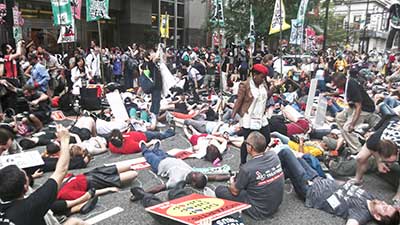

‘Die-in’ protest at headquarters of pharmaceutical industry.WW photo: Gerry Scoppettuolo
Washington, D.C. – Thousands of HIV-positive people and activists from all over the globe came to the International AIDS Conference in Washington, D.C., in July to confront big drug companies and wealthy capitalist nations and to demand cheaper drugs and desperately needed prevention and treatment programs.
They came from as far away as South Africa and Hattiesburg, Miss. They came to fight for the survival of millions of people living with the virus in the U.S. and in the global South. Activists had successfully fought to lift a travel ban preventing HIV-positive people from entering the U.S.
For six days, activists carried out marches, occupations, “die-ins,” rallies and other direct action. They were joined by many researchers, scientists and advocates from among the 25,000 who attended the conference from about 200 countries.
From the opening ceremonies to the very end of the conference, activist voices rang out loud and often. On July 22, protestors ran to the stage to confront U.S. Secretary of State Hillary Rodham Clinton and her support of the Trans-Pacific Partnership. The TPP is a free trade agreement being negotiated between Singapore, Malaysia, Vietnam, Brunei Darussalam, Australia, New Zealand, Chile, Peru and the U.S. that could limit the manufacture of generic HIV medication in countries that need them. In Asia and the Pacific region, only 39 percent of people with HIV receive the anti-retroviral treatment they need. (Plus News, July 12)
On July 24, 10,000 marched behind the banners of the We Can End AIDS Coalition, pouring through downtown Washington, D.C., and chanting, “Pills costs pennies, profits cost lives!” A Bank of America branch along the march route decided to stay closed for the day, rather than contend with angry protesters. Activists are calling for a “Robin Hood tax,” a tax on Wall Street financial transactions. A large contingent from National Nurses United spearheaded the July 24 mobilization, joined by members of the Food and Commercial Workers union and the Service Employees union.
The march proceeded to the Office of the U.S. Trade Representative and conducted a “die-in” to protest the TPP. The largest of the five wings of the massive protest stopped at the national headquarters of the Pharmaceutical Research and Manufacturers of America.The action culminated in a rally at Lafayette Park and the arrest of 15 people who were placing red ribbons on the fence surrounding the White House. Mounted riot police were used to keep the protesting crowd back.
After his arrest, Michael Tikili, from Health GAP (Global Access Project), told WW: “When someone gets arrested for a cause, it means something. HIV is connected to so many inequalities; for instance, [Immigration and Customs Enforcement] and the detention of immigrants. The HIV movement needs to do things like uniting with the Occupy Wall Street and other struggles.”
Protests were held every day during the conference. People with HIV and activists from many groups took part, including Health GAP; Housing Works; the AIDS Coalition to Unleash Power (ACT UP) NY, ACT UP Philadelphia, ACT UP Boston and ACT UP Paris; the Student Global AIDS Campaign; the International Treatment Preparedness Coalition; the AIDS Healthcare Foundation; and many others. Spontaneous marches were held throughout the conference, the largest being organized by Housing Works from New York City.
On the fourth day of the conference, July 25, an international contingent of 75 protesters raised banners and took to the main stage to demand that the Global Fund to Fight AIDS, Tuberculosis and Malaria resume its recently canceled funding round on an as-needs basis, without the imposition of arbitrary caps. Although many poor countries depend on the Global Fund, rich country donors have not kept up with their financial commitments to it, using the pretext of austerity while at the same time finding hundreds of billions to fund NATO-led, so called “rebel” movements, first in Libya and now in Syria.
U.S. immigration policy had banned attendance of delegates who were sex workers or convicted drug users. Nevertheless, many organized groups representing sex workers and the harm reduction movement attended.
That same day, activists from the Global Network of Sex Work Projects protested at a conference panel on “The U.S. Congress and the Global AIDS Epidemic,” which was chaired by archconservative former Senate majority leader and Hospital Corporation of America multimillionaire, Bill Frist. At the end of the panel, a Gambian HIV activist confronted Frist directly from the convention floor, telling him that “millions of lives would have been saved if you had listened to us before.”
International activists from poor countries in the global South are wary about HIV prevention breakthroughs ballyhooed by rich countries. An example is Pre-Exposure Prophylaxis or PrEP, an expensive preventative pill that uninfected people may take to prevent infection from positive partners. As explained to WW by Morris Edwards from the Pan Caribbean Partnership Against HIV and AIDS, “PrEP is a rich person’s remedy for a global problem.”
Activists will continue to demand what people with HIV need until greed and profits are replaced by a system that truly serves the needs of the people.
Imani Keith Henry contributed to this article.
Download the PDF Black and white version All out for May Day! Students defend pro-Palestine…
By Jonas, Mutual Aid Scientific Socialism To the workers and free peoples of the world: We…
Houston Mumia’s supporters gathered in Houston’s historic Emancipation Park on April 27, not just to…
El Partido Mundo Obrero (PMO/WWP) saluda el 50 aniversario de la impresionante victoria de la…
Spain’s Prime Minister Pedro Sanchez cancelled a multimillion-dollar arms deal recently to buy munitions from…
Buenos Aires, April 15, 2025 Katz is an economist, researcher at the National Scientific and…